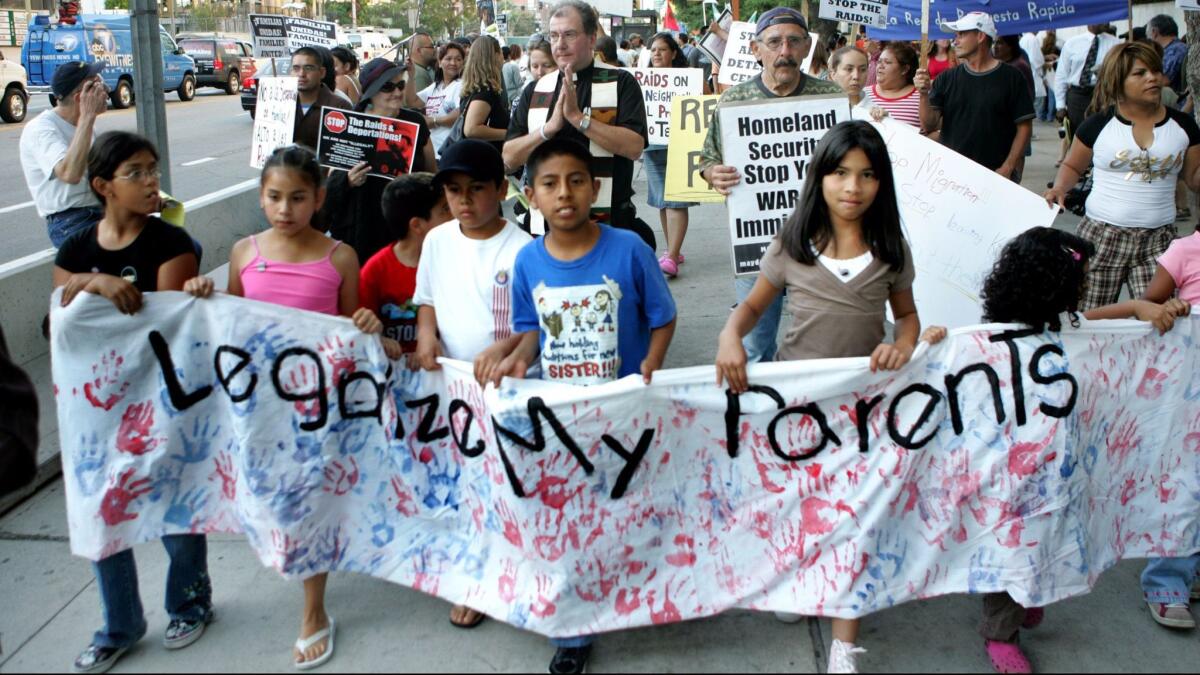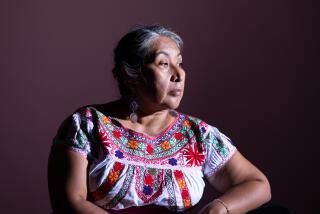Immigration activist allowed to remain in United States for another year
Reporting from CHICAGO â A twice-deported immigration activist whose year of living in a Chicago church a decade ago made her a lightning rod in the immigration debate, was granted a reprieve Wednesday and allowed to remain in the United States for another year.
âI want to send a message to the community so they can all fight together and not stay home and watch how all of the executive orders are affecting us,â Elvira Arellano said through a translator after leaving a meeting with federal officials. âIt could be the fighting that we could convince Donald Trump to do something for us.â
Arellano, 42, and her lawyer attended an annual check-in Wednesday with Immigration and Customs Enforcement in Chicago, the third such appointment since she returned to the U.S. from Mexico in 2014. Authorities extended her parole for a year. She is awaiting a hearing on her petition for political asylum.
The routine appointments â part of a parole system for people living in the U.S. illegally â have become dicey for some immigrants since President Trumpâs administration stepped up enforcement and expanded the pool of immigrants who are targeted for removal.
In Phoenix, a single father of three U.S.-born children reported to a regular meeting to discuss his request for asylum and was deported the next day. In Denver, a mother of four fearful of that same fate skipped her meeting and sought sanctuary in a church like Arellano did a decade ago. Meanwhile, other immigrants have gone to their check-ins and been allowed to stay in the U.S.

âOur families made the struggle coming here and sacrificing their lives,â said Saul Arellano, said Arellanoâs 18-year-old, U.S.-born son. âItâs now our time to fight for them because they have rights as human beings. Itâs time for the youth to rise up and fight for our parents. ⌠Weâre not going back any more. Weâre going forward.â
Supporters of Trumpâs efforts to increase deportations have said people like Arellano exemplify the arrogance of immigrants who are here illegally but believe they have a right to stay. Arellano broke laws, including coming to the U.S. more than once without legal documentation, and shouldnât be allowed to remain, they say.
Arellanoâs journey as an activist began in the 1990s when the economy collapsed in her Mexican home state of MichoacĂĄn. She went to work in a maquiladora, a factory on the U.S. border, making $5.60 a week. After failing to cross the border once, she tried again in 1997 and headed for Yakima, Wash., to join family.
She worked as a babysitter and had Saul. In 2000, she moved to Chicago, where she joined other family members and took a job vacuuming planes at OâHare International Airport.
Months after the Sept. 11, 2001,, terrorist attacks, federal agents came to her house in Chicago at dawn as part of Operation Tarmac, a nationwide sweep of airport employees living in the U.S. illegally. In addition to reentering the country illegally after a prior deportation, Arellano had been working with a fake Social Security number. A federal defender convinced her to plead guilty to a felony, and removal proceedings began, said her attorney, Chris Bergin.
Arellano, a shy but fierce mother, fought every turn of her case. She was granted at least three stays of deportation.
But in August 2006, she was told to report to the Department of Homeland Security for removal. Instead of showing up on the morning of her appointment, she stepped up to the pulpit of Adalberto United Methodist Church in Chicagoâs Humboldt Park neighborhood, vowing to stay in the church indefinitely with her then-7-year-old son, a U.S. citizen.
Arellano became the face of the new sanctuary movement, a political strategy in the U.S. that first unfolded in the 1980s. Drawing from sacred texts that teach loving thy neighbor and welcoming the stranger, churches and synagogues committed acts of civil disobedience by housing immigrants fleeing civil wars in Central America.
Though churches canât guarantee protection, they are generally off-limits to law enforcement raids. Arellano stayed in the church for a year. She was arrested in Los Angeles, where she traveled for an immigration reform rally and was deported that same day.
Arellanoâs activism continued in Mexico, where she fought for better treatment of Central Americans traveling through to the U.S. to seek asylum. She dodged gunfire at rallies, received death threats and locked the doors of her home in MichoacĂĄn to prevent kidnappers from taking Saul. In 2014, she led a group of asylum seekers to the U.S. border and encouraged them to cross. She called Saul and suggested he join her in doing the same. He did, and they were detained.
A U.S. citizen, Saul was quickly released. Arellano and another son, then-5-month-old Emiliano, stayed in detention for two days before they were released to petition for asylum.
Right now, Arellano, who has a legal work permit, holds two jobs â one preparing food at a Puerto Rican restaurant and another delivering the Chicago Tribune at dawn.
Emilianoâs father and Saul, who is set to graduate from high school in June, also work several jobs to help make ends meet. Only English is spoken at home with 3-year-old Emiliano, so Arellano is slowly learning the language herself.
Brachear Pashman and Ortiz Healy write for the Chicago Tribune.
ALSO
Fearful parents sign papers for friends to care for kids in case theyâre deported
More to Read
Sign up for Essential California
The most important California stories and recommendations in your inbox every morning.
You may occasionally receive promotional content from the Los Angeles Times.










